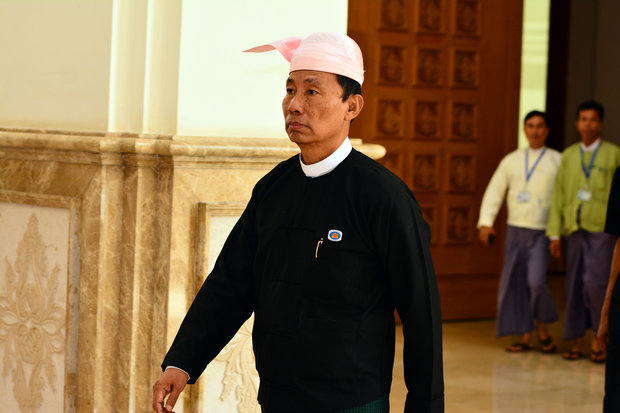The following DVB article has been edited into a style of English that should suit upper-immediate and advanced learners of the language. Difficult words and grammar structure are marked so you can read the definition in Burmese (sorry, Burmese only). We also include some grammar instruction when complicated examples appear (marked in red). You can find more examples of the highlighted words at the foot of the page.
Tune into DVB for more Easy English news reports. Simply go to: Scholar’s Corner
A recommendation by the parliament’s Joint-Bill Committee to suspend discussion on the bill yesterday was passed with 264 votes supporting, 235 objections, and 12 abstentions.
“Dear representatives of parliament, as supported by a majority in the vote, I confirm that the discussion to adopt the bill concerning recall of MPs will be suspended,” said the parliament’s speaker Shwe Mann.
The controversial proposal, which would permit the removal of MPs if one percent of their constituents signed a petition against them, was widely seen by observers as a move against Shwe Mann himself. The house speaker was criticised by his own party for siding with opposition leader Aung San Suu Kyi in her campaign to dilute the military’s hold on parliament.
Last week, in a dramatic middle-of-the-night internal coup, Shwe Mann was ousted from his position as chairman of the ruling Union Solidarity and Development Party (USDP). He remains house speaker and is currently listed to contest the November general election for his party in the township of Phyu.
On Thursday, 15 lawmakers in the bicameral Union Parliament participated in debate on the Right to Recall bill. Ye Tun, a Lower House MP from Hsipaw in Shan State, said only two of the lawmakers who spoke at the session expressed support for the draft legislation.
“A couple of MPs – U Hla Swe, MP from Magwe, and the military’s Brig-Gen Tint San – suggested the bill be adopted into law as quickly as possible,” he said. “However, the rest, including USDP and NLD representatives, recommended that the bill be thoroughly studied before going ahead.” said Ye Tun.
Speaking to reporters outside parliament on Monday*, outspoken lawmaker Hla Swe said, “With regard to the [USDP] chairman position – the truth is that it was him [Shwe Mann] who seized that position in the first place. U Shwe Mann was supposed to be the vice-chairman but instead of that – at the party conference in 2010 – we heard an announcement saying, ‘Here comes the party chairman’. We turned around and looked, and saw U Shwe Mann.
“So now, U Thein Sein is just reclaiming his position; that’s all.”
Grammar:
The Oxford comma:
Eg: “A recommendation by the parliament’s Joint-Bill Committee to suspend discussion on the bill yesterday was passed with 264 votes supporting, 235 objections, and 12 abstentions.”
The comma between ‘objections’ and ‘and’ is a modern punctuation to help avoid ambiguities or misunderstandings. It is commonly used in journalism and with lists.
Examples: http://grammar.about.com/od/grammarfaq/f/QAoxfordcomma.htm
Subjunctive mood:
Eg: “A couple of MPs – U Hla Swe, MP from Magwe, and the military’s Brig-Gen Tint San – suggested the bill be adopted into law as quickly as possible,”
Using ‘be’ instead of ‘is’ or ‘should be’ is the correct grammar because ‘suggested’ implies that the action is unsure or conditional. It can also be used in imaginary situations; such as: “I wish … ” “It is possible that …” .
Examples: http://grammarist.com/grammar/subjunctive-mood/



